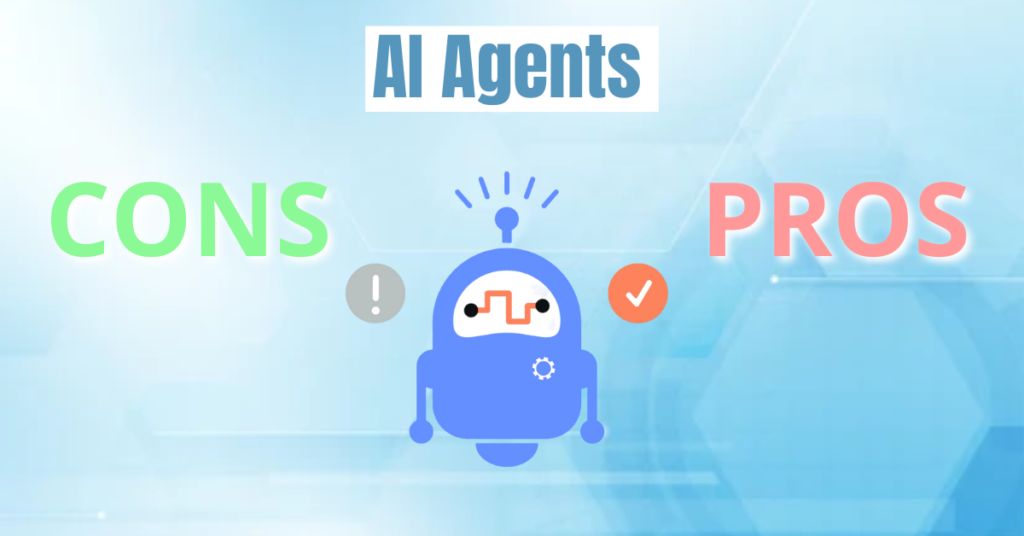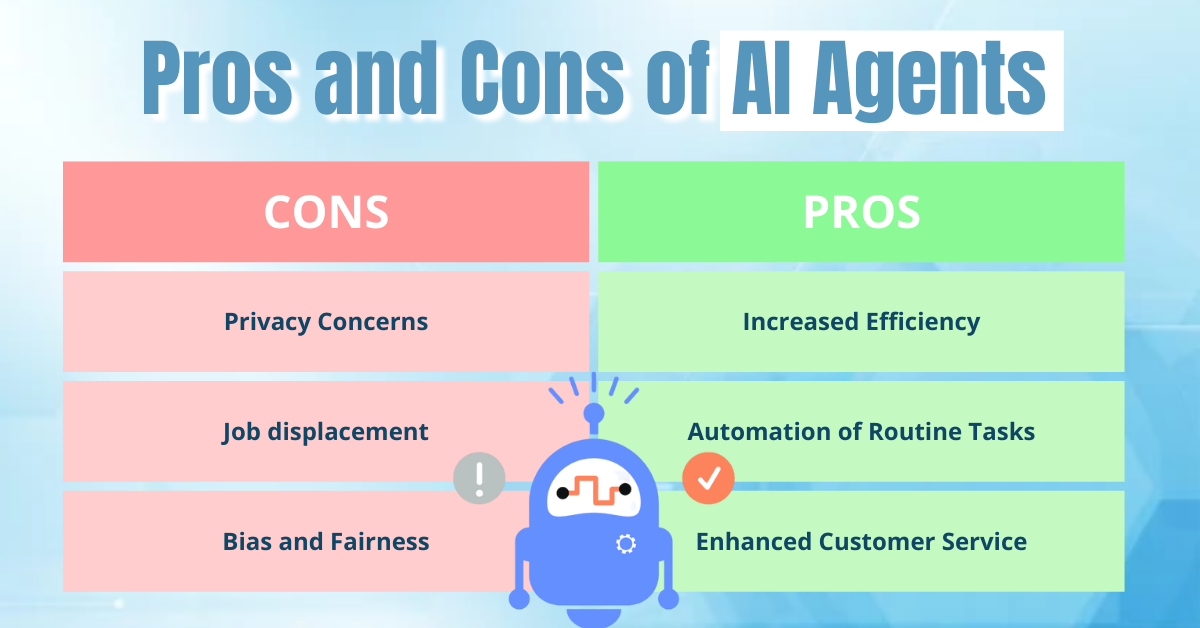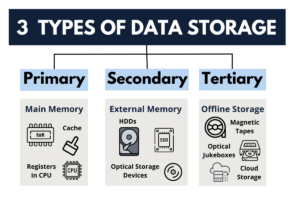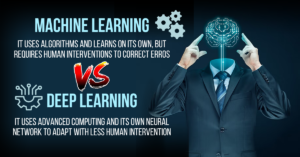Introduction
Do you want to know what are the pros and cons of AI agents to keep up with the latest in artificial intelligence?
AI agents are reshaping how both work and everyday tasks get done. This article peels back the layers on these intelligent computer programs, showcasing their benefits and addressing the challenges they pose.
Get ready to discover everything you need to know about AI agents in 2024!
Table of Contents
Key Takeaways on Pros and Cons of AI Agents
- AI agents are smart programs that help you do tasks quicker and more accurately. They can sort through loads of information to give useful advice or make things run smoother in businesses.
- There are many types of AI agents like simple reflex agents, model-based reflex agents, goal-based agents, utility-based agents, and learning agents. Each type has its own way of working and helps in different areas such as playing games, offering customer service, or making decisions in business.
- Using AI brings big benefits like doing jobs faster and getting better at solving problems. For example, they can turn boring chores into easy tasks and dig through data to find important insights.
- There are some worries about using AI too. People are concerned that AI might make wrong choices or invade their privacy. It’s important to keep an eye on these issues as we use more AI in our lives.
- Real-life uses for AI include understanding human talk using natural language processing, robotics where machines do tasks on their own, giving people personalized suggestions based on what they like or did before, and getting smarter over time with machine learning techniques.
Understanding AI Agents
AI agents serve various roles in artificial intelligence, each designed for specific tasks. Different types include simple reflex agents, model-based reflex agents, goal-based agents, utility-based agents, and learning agents.
Definition and Purpose
AI agents are smart programs that make your life and work easier. They help with tasks, making things faster and more accurate. These cutting-edge helpers can look through huge amounts of information to find important insights just for you or your business.
With AI Agents 2.0, companies get a big boost by using them to improve how they make decisions and manage resources.
AI agents give you the power to do more with less effort.
These intelligent agents also shine in serving customers uniquely, offering advice or recommendations tailored personally to them. Concerns about their control and use teach us the importance of handling these powerful tools responsibly to protect privacy and prevent misuse.
Whether it’s automating boring tasks or analyzing data, AI agents stand ready as invaluable allies in navigating the technological advances today.
Role in Artificial Intelligence
Now let’s talk about AI agents’ role in Artificial Intelligence. These virtual assistants and automation tools play a crucial part in the ever-evolving realm of technology. They’re designed to enhance processes, make tasks more efficient, and provide valuable insights through data analysis.
For instance, AI agents can be utilized for natural language processing and robotics to navigate complexities. Moreover, they underpin machine learning techniques that are tailored towards personalized recommendations, improving customer service experiences through cognitive computing.
Additionally, these AI agents unlock the secrets of automating tasks across various industries.

Advantages of using AI agents
AI agents are making waves by boosting efficiency in both your daily life and the workplace. These savvy tools streamline processes like never before. With their help, tasks get done quicker, making everything from your job to managing your home a breeze. Here’s a quick look at how these smart agents can transform your world:
| Advantage | Description |
|---|---|
| Increased Efficiency | Tasks are completed faster, thanks to AI agents streamlining processes. |
| Step-by-Step Guidance | AI agent-assist software provides detailed instructions and can pull information from various sources to help you. |
| Invaluable Business Support | AI Agents 2.0 offers groundbreaking support, driving businesses towards success. |
| Automation of Routine Tasks | From scheduling meetings to sorting emails, AI agents take over repetitive tasks, freeing up your time. |
| Data Analysis and Insights | These agents can sift through large datasets quickly, offering valuable insights that help in decision-making. |
| Enhanced Customer Service | Personalized interactions led by AI improve customer experiences, making services feel more tailored. |
| Optimized Decision-Making | AI agents assist in making informed decisions, optimizing the use of resources effectively. |
By embracing AI agents, you’re stepping into a world where efficiency and smart assistance improve how you tackle tasks and make decisions, ensuring a smoother, more efficient lifestyle and work environment. Now the next of the pros and cons of AI agents.
The Cons of Using AI Agents
While AI agents can be very helpful, they also come with some significant drawbacks that are important to consider.
Privacy Concerns
AI agents often require access to large amounts of personal data. This raises concerns about how this information is stored, used, and protected. Unauthorized access or data breaches can compromise sensitive information.
Job Displacement
As AI agents become more capable, they can replace human workers in various jobs. This leads to unemployment and economic instability for affected individuals and communities, as machines take over roles traditionally filled by humans.
Bias and Fairness
AI agents can sometimes reflect and amplify human biases present in their training data. This can lead to unfair or discriminatory outcomes, affecting decisions in critical areas such as hiring, law enforcement, and lending.
Security Risks
AI agents can be vulnerable to hacking and other security threats. Malicious actors can manipulate AI systems to perform harmful actions or spread misinformation, posing significant risks to users and organizations. Check next how how protect your cloud storage security.
Lack of Transparency
AI agents often operate as “black boxes,” making it difficult to understand how they arrive at specific decisions. This lack of transparency can lead to mistrust and makes it challenging to hold AI systems accountable for their actions.
Dependency and Reduced Skills
Overreliance on AI agents can lead to a reduction in human skills and critical thinking. As people depend more on AI for tasks and decision-making, they may lose the ability to perform these tasks independently or critically evaluate outcomes.
In summary, while AI agents offer many benefits, it is crucial to address these drawbacks to ensure their responsible and fair use.

Types of AI Agents
Explore different types of AI agents, each with distinct characteristics and capabilities. Delve into how these agents operate and their specific roles in artificial intelligence.
(Check next What Are the 4 Types of AI, The Fourth will Surprise You)
Simple Reflex Agents
Simple reflex agents operate based on a set of predetermined rules and actions, responding to specific environmental cues. These agents are programmed to react directly to stimuli without considering the broader context or history, making decisions solely based on the current input.
For example, a thermostat adjusting temperature when it reaches a certain point is an application of a simple reflex agent. The primary advantage is their speed in decision-making, but they lack the ability to adapt to dynamic situations.
In real-life applications, simple reflex agents can be found in automated systems such as motion sensors that trigger lights in response to movement or vending machines dispensing products when specific coins are inserted.
These examples demonstrate how these agents are designed with straightforward responses for uncomplicated tasks, showing their utility in daily life.
Model-Based Reflex Agents
Now, let’s transition to Model-Based Reflex Agents, where knowledge of the current state is used to make decisions based on future outcomes. These AI agents rely on an internal model of the world and are capable of taking actions that consider possible sequences of events.
By utilizing this approach, they can anticipate potential consequences and plan accordingly.
Model-Based Reflex Agents hold significant promise in enhancing decision-making processes by leveraging their ability to simulate multiple scenarios and predict outcomes based on different courses of action.
This capability allows for more strategic planning and execution, leading to improved efficiency and performance across various domains such as robotics, data analytics, and personalized recommendations.
As these agents continue to evolve with advancements in algorithms and machine learning techniques, they are poised to play a pivotal role in navigating complex real-world challenges while providing invaluable support in both personal and professional spheres.

Goal-Based Agents
Transitioning from model-based reflex agents to goal-based agents, you must know that these agents are designed to achieve specific objectives or goals. They have the ability to assess different actions and their outcomes in order to make decisions that align with achieving their set goals.
These AI agents utilize a form of reasoning that prioritizes actions based on how they bring them closer to reaching the desired outcome. For instance, when it comes to chatbots, a goal-based agent can analyze user input and select the most appropriate response in order to fulfill the objective of providing helpful information.
In practical terms, AI’s capability is continually advancing towards ensuring seamless human interaction through these goal-based agents.
Their purpose encompasses not only providing accurate responses but also navigating ethical considerations and data privacy concerns for improved performance.
Utility-Based Agents
Now that you have learned about Goal-Based Agents, let’s dive into Utility-Based Agents. These AI agents make decisions based on a utility function, which assigns values to outcomes.
The purpose is to maximize the overall utility of their actions in specific situations. For example, in healthcare, a utility-based agent may prioritize treatments that yield the most favorable patient outcomes.
These agents are invaluable when it comes to optimizing resource allocation and decision-making processes. Imagine an AI agent used by a shipping company – it could assess various factors such as cost, time efficiency, and environmental impact to determine the most optimal routes for deliveries.
This results in improved operational efficiency while minimizing costs and environmental footprint.
By leveraging these real-life examples from different industries, you gain firsthand experience of how Utility-Based Agents play a crucial role in enhancing decision-making processes and resource optimization across various sectors.
Learning Agents
Transitioning from utility-based agents to learning agents, it’s essential to understand the role of AI agents in evolving processes and problem-solving. Learning agents are designed to adapt and improve based on experience and feedback.
They can analyze large volumes of data, continuously learn from interactions, and make decisions based on past experiences, aiming to enhance performance over time.
Learning agents hold immense potential for various industries, such as customer service where they can provide personalized recommendations or in business operations where they aid in optimizing resource allocation.
These agents also raise ethical concerns regarding privacy that need consideration as their capabilities continue to expand.

Real-Life Applications of AI Agents
AI agents are at the core of Natural Language Processing, Robotics, and delivering personalized recommendations. They play a vital role in improving AI agent performance using advanced machine learning techniques. Of course, these real-life applications have their own pros and cons of AI agents.
Natural Language Processing
Natural Language Processing (NLP) is a vital aspect of AI agents, enabling them to understand and interpret human language. These smart agents use NLP to comprehend, analyze, and respond to natural language inputs like text or speech.
For example, chatbots rely on NLP to understand the user’s questions and provide relevant responses in real-time. This technology allows AI agents to communicate with you in a way that feels natural and effortless.
AI agents leverage NLP to process vast amounts of textual data from diverse sources such as social media, customer reviews, or emails. By doing so, they can extract valuable insights for businesses and individuals alike.
For instance, companies use sentiment analysis powered by NLP to gauge public opinion about their products or services across various online platforms. This demonstrates how AI agents equipped with NLP capabilities efficiently handle complex communication tasks.

Robotics
Robotics involves the use of AI agents to automate tasks in various industries. These agents are designed to enhance efficiency and make processes more streamlined. For example, in manufacturing, robotics can be utilized to assemble products with precision and speed.
Additionally, AI-powered robots can perform repetitive or dangerous tasks, ensuring safety in workplaces. Utilizing robotics in industries like healthcare can improve patient care by assisting with surgeries and providing support for rehabilitation therapies.
In the realm of education, AI agents integrated into robotic systems enable interactive learning experiences for students. They provide personalized support and feedback, catering to individual learning styles.
Through hands-on programming and exploration, students gain firsthand experience with advanced technologies while developing critical thinking skills. Furthermore, robotics competitions such as FIRST Robotics challenge students to design and build innovative robots that tackle real-world problems.
Personalized Recommendations
Transitioning from robotics to personalized recommendations, AI agents can use data analysis to offer tailored suggestions based on your preferences and behavior. Imagine a world where every product or service recommendation feels like it’s been hand-picked for you.
This is what personalized recommendations aim to achieve – enhancing user experiences by providing relevant and customized suggestions. For example, AI-powered platforms like streaming services leverage your viewing history and preferences to recommend new shows or movies that align with your interests, enriching your content discovery.
In the realm of e-commerce, AI agents analyze your purchase history and browsing patterns to suggest products that are more likely to appeal to you. This tailored approach not only enhances user satisfaction but also contributes significantly to businesses’ sales revenue.
Through these targeted suggestions, AI agents empower companies in delivering a more personalized and engaging customer experience while increasing the likelihood of purchases based on individual preferences.

Improving AI Agent Performance
To enhance AI agent performance, continual updates and optimizations play a crucial role. This is evident as AI Agents 2.0 introduced groundbreaking innovations that significantly improved the efficiency of these agents in various industries.
The ability to automate tasks and analyze large volumes of data makes AI agents invaluable for optimizing resource allocation and decision-making processes.
Machine Learning Techniques
Machine learning techniques enable AI agents to learn from data and improve their performance over time. These techniques allow AI agents to analyze patterns, make predictions, and adapt to new information without being explicitly programmed.
They are crucial in enhancing the capabilities of AI agents across various domains such as natural language processing, robotics, and personalized recommendations. Through machine learning techniques, AI agents can continuously enhance their decision-making processes based on the analyzed data.
In business settings, machine learning techniques empower AI agents to provide tailored solutions by understanding customer preferences and behavior patterns. For example, they can recommend products or services based on individual needs and past interactions.
Moreover, these techniques play a vital role in optimizing resource allocation by analyzing large volumes of data efficiently. As a result, businesses can make informed decisions that enhance operational efficiency and customer satisfaction while improving overall performance.

Conclusion – Pros and Cons of AI Agents
Now you know what are the main cons and pros of AI Agents. With their ability to automate tasks and enhance decision-making processes, these agents offer a glimpse into an ever-evolving realm of technology.
Embracing the benefits while addressing ethical concerns will be crucial as we embark on this journey. As you explore real-life applications and consider the impact of AI agents, stay informed and engaged in this dynamic landscape. Good luck with your AI projects!
FAQs – Pros and Cons of AI Agents
1. What are the pros and cons of AI agents in 2024?
AI agents have both benefits and drawbacks in 2024. The pros include efficiency, accuracy, and cost savings. On the other hand, issues like ethics and dependency on technology are among the cons.
2. How has our understanding of AI agents evolved by 2024?
By 2024, we’ve learned a lot more about AI agents. We now understand their potential for automation as well as the ethical considerations that come with it.
3. Why is ethics a concern when exploring the pros and cons of AI agents?
Ethics is important because it helps us navigate how to use these powerful tools responsibly so they can be beneficial without causing harm or unfairness.
4. Are there any major changes expected in how we use AI Agents beyond 2024?
While it’s hard to predict exactly what will happen beyond 2024, continued advancements in technology suggest that our reliance on AI agents will only grow over time.





